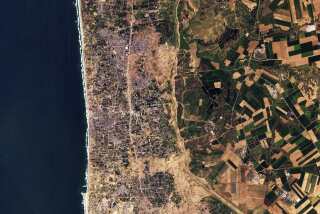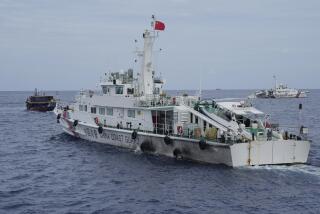Cyprus’ Greek side razes part of barrier
- Share via
NICOSIA, CYPRUS — Greek Cypriots on Thursday dismantled a key part of the “green line” barrier that has divided this island’s capital for more than 40 years, and they called on Turkey to respond by removing its troops from the area.
“Tonight we have demolished the checkpoint on our side,” Cypriot President Tassos Papadopoulos said in Brussels.
But he made it clear that no civilian would be able to cross the line where the checkpoint had been unless Turkey removed its military from the area.
The first sign of the Greek Cypriot move came late Thursday when heavy machinery rumbled along Ledra Street in the heart of Nicosia’s commercial district. Drilling was then heard and trucks carried debris away.
Crowds gathered on both sides to witness the dismantling of the 16-foot-high concrete barrier.
“It’s a lovely thing to see the wall come down. We’ve waited years for this,” said Turkish Cypriot Yusuf Alp, a construction worker. “Hopefully people will change and get more used to living together. Even if it takes another 50 years, this is a step.”
His words were echoed by Greek Cypriots.
“This is a very important day for Cyprus,” said Tina Sophocleous, a member of a peace group. “This could lead to the reunification of Nicosia.”
The barrier is a popular vantage point to view Nicosia’s buffer zone, a no man’s land of abandoned shops and homes civilians are not allowed to enter.
Turkish Cypriot authorities eased restrictions on visits in 2003, and five crossing points have been erected since then between Cyprus’ north and south.
The United Nations, which has tried to reunite Cyprus in a federation, said it hoped the border crossing would open soon.
In December, Turkish Cypriots dismantled a footbridge on the other side of the wall. Greek Cypriot authorities protested at the time, saying security issues had to be considered before the bridge could be torn down.
Ledra Street cuts across the cease-fire line that has divided Nicosia’s Greek and Turkish Cypriot residents since intercommunal violence in the 1960s, and a Turkish invasion in 1974 that was triggered by a brief Greek-inspired coup.
Cyprus remains a stumbling block to Turkey’s aspirations to join the European Union and a source of tension with Greece. Greek Cypriots voted against a U.N. reunification plan shortly before joining the EU in 2004.
More to Read
Sign up for Essential California
The most important California stories and recommendations in your inbox every morning.
You may occasionally receive promotional content from the Los Angeles Times.










